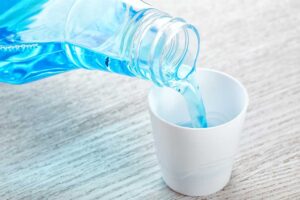
Our journey toward optimal dental health typically involves a trio of practices: brushing, flossing, and mouthwash. Recent research, however, casts doubt on the unmitigated benefits of mouthwash, especially concerning its impact on the oral microbiome. This comprehensive exploration delves into the risks associated with mouthwash and introduces natural, microbiome-friendly alternatives for oral care.
In-depth Look at the Oral Microbiome
The oral microbiome is an intricate network of microorganisms residing in our mouth, including bacteria, viruses, fungi, and protozoa. This ecosystem is not just a bystander but an active participant in our overall health. It is crucial in preventing oral diseases like tooth decay and gum disease and influences our digestive and respiratory health.[1,3] The health of this microbiome is sensitive to changes, including those brought about by dietary habits, oral hygiene practices, and the products used for mouth care, such as mouthwash.[2]
Rethinking the Use of Mouthwash
Mouthwash is commonly believed to be an essential part of dental hygiene. However, its effects on the oral microbiome can be detrimental. Mouthwashes often contain broad-spectrum antibacterial agents, indiscriminately targeting harmful and beneficial bacteria.[2] Alcohol, a prevalent ingredient, can lead to a dry mouth by impairing saliva production, which is crucial for acid neutralization and enamel repair.[4]
Chlorhexidine, another common component, though effective against plaque, can cause taste alterations and tooth staining with long-term use. Disturbingly, some studies suggest a link between frequent mouthwash use and heightened oral cancer risk.[5] Additionally, altering the oral microbiome can have wider health implications, such as increased hypertension risk, potentially due to the destruction of beneficial bacteria in regulating blood pressure.[6]
Natural Alternatives for Oral Hygiene
Given the potential hazards of traditional mouthwash, it’s important to consider natural alternatives that are kinder to the oral microbiome:
- Saltwater Rinse: A mild solution that can cleanse the mouth, help balance pH levels, and reduce bacterial presence.
- Oil Pulling: An ancient technique involving swishing oils like coconut or sesame in the mouth believed to draw out toxins, lessen plaque buildup, and support gum health.
- Herbal Mouth Rinses: Homemade rinses using natural antibacterial agents like aloe vera, tea tree oil, or clove offer a gentler approach to maintaining oral hygiene.[7]
- Probiotic Lozenges: Specifically chosen probiotic strains can aid in rebalancing the oral microbiome, particularly beneficial following antibiotic treatments.[8]
- Green Tea Rinse: With its natural anti-inflammatory and antibacterial properties, green tea can help reduce plaque and gingivitis while providing antioxidants.
- Hydration and Diet: Staying well-hydrated and consuming a diet rich in fruits, vegetables, and fiber significantly supports oral health and the microbiome.[9]
Conclusion: A Holistic Approach to Oral Wellness
While traditional mouthwash may offer some benefits, its long-term use can potentially disrupt the oral microbiome and negatively impact overall health. Embracing alternatives like saltwater rinses, oil pulling, herbal mouth rinses, probiotic lozenges, green tea rinses, and a balanced diet and proper hydration can lead to improved oral and general health. Consulting with dental professionals is recommended to tailor the best oral care regimen for individual needs.
References:
- Deo, Priya Nimish, and Revati Deshmukh. “Oral microbiome: Unveiling the fundamentals.” Journal of Oral and Maxillofacial Pathology: JOMFP vol. 23,1 (2019): 122-128.
- Brookes, Zoë, et al. “Mouthwash Effects on the Oral Microbiome: Are They Good, Bad, or Balanced?” International Dental Journal, 2023.
- Pathak, Janak L., et al. “The Role of Oral Microbiome in Respiratory Health and Diseases.” Respiratory Medicine, vol. 185, 2021.
- Buzalaf, Marília Afonso Rabelo et al. “Saliva and dental erosion.” Journal of applied oral science: Revista FOB vol. 20,5 (2012): 493-502.
- Ustrell-Borràs, M et al. “Alcohol-based mouthwash as a risk factor of oral cancer: A systematic review.” Medicina oral, patologia oral y cirugia bucal vol. 25,1 e1-e12. 1 Jan. 2020.
- Joshipura, Kaumudi, et al. “Over-the-counter mouthwash use, nitric oxide, and hypertension risk.” Blood pressure vol. 29,2 (2020): 103-112.
- Kamath, N P et al. “The effect of aloe vera and tea tree oil mouthwashes on the oral health of school children.” European Archives of pediatric dentistry: official journal of the European Academy of Paediatric Dentistry vol. 21,1 (2020): 61-66. doi:10.1007/s40368-019-00445-5
- Haukioja, Anna. “Probiotics and oral health.” European Journal of Dentistry vol. 4,3 (2010): 348-55.
- Scardina, G A, and P Messina. “Good oral health and diet.” Journal of biomedicine & biotechnology vol. 2012 (2012): 720692. doi:10.1155/2012/720692




Leave a Reply
Your email is safe with us.